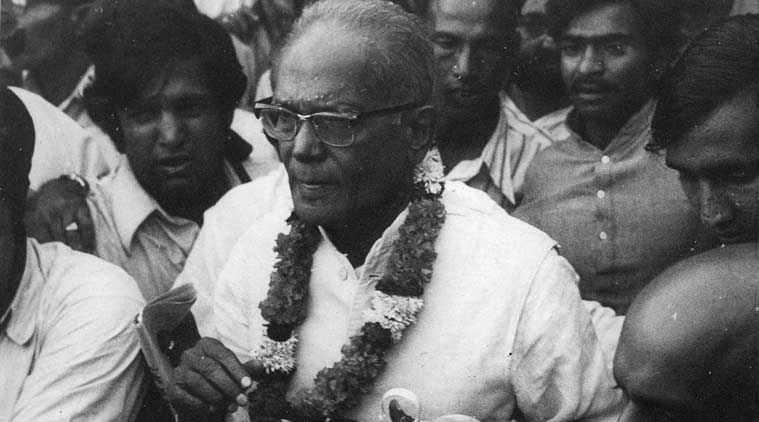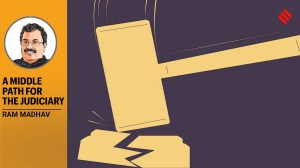In fact: Why Jayaprakash Narayan is more than his leadership during Emergency
As JP’s invisible presence looms large over the Bihar election, there is an attempt by all parties to claim his legacy.
 This March, the union Cabinet cleared a proposal to build a memorial for Jayaprakash Narayan at his birthplace, Sitabdiara in Bihar’s Saran district. Two weeks ago, the government celebrated his 113th birth anniversary in New Delhi. Prime Minister Narendra Modi said JP’s idea of Sampoorna Kranti (Total Revolution) should guide the government in bringing about Sabka Saath, Sabka Vikas, and to strengthen democracy. As JP’s invisible presence looms large over the Bihar election, there is an attempt by all parties to claim his legacy. But to situate JP in the period when he engaged with parties irrespective of their ideology to build a united front against political authoritarianism, and ignore the rest of his political life, is to misread the man.
This March, the union Cabinet cleared a proposal to build a memorial for Jayaprakash Narayan at his birthplace, Sitabdiara in Bihar’s Saran district. Two weeks ago, the government celebrated his 113th birth anniversary in New Delhi. Prime Minister Narendra Modi said JP’s idea of Sampoorna Kranti (Total Revolution) should guide the government in bringing about Sabka Saath, Sabka Vikas, and to strengthen democracy. As JP’s invisible presence looms large over the Bihar election, there is an attempt by all parties to claim his legacy. But to situate JP in the period when he engaged with parties irrespective of their ideology to build a united front against political authoritarianism, and ignore the rest of his political life, is to misread the man.
Bihar in the 1970s became the testing ground for sampoorna kranti. In the 1930s and 40s, JP was the leader idealistic youth looked up to. He, perhaps, saw the same spirit of idealism and rebellion in the students who came out on the streets against corruption in high places. JP read the ferment of the early 1970s, which emerged against the backdrop of largescale disillusionment with the political mainstream and in the aftermath of the student unrest in Europe, as the appropriate moment to implement a transformative political programme. After leaving socialist politics for Vinoba Bhave’s sarvodaya movement, JP had consistently expressed his disillusionment with political parties, and argued for a communitarian democracy. Parties, he felt, were centralised and, hence, susceptible to moral and financial corruption. JP saw the youth, especially the students, as the agency that could help him realise his ideas of a new politics.
History, however, had other ideas. When Indira Gandhi declared the Emergency in 1975, JP’s focus shifted to rescuing democracy from authoritarian rule. The opposition parties turned to him for moral guidance and leadership. Historical circumstances forced him to take their help to organise the people against the Emergency. He disagreed with the parties on many counts, but felt he could persuade them to change as per his vision. This marked his strategic engagement with the political right, especially the RSS and its political front, the Jana Sangh, during the anti-Emergency struggle.
JP had a clear position on majoritarian communalism. In his address to a national conference against communalism in 1968, JP said that although almost every religious community had its own brand of communalism, Hindu communalism was more pernicious than the others because “Hindu communalism can easily masquerade as Indian nationalism and denounce all opposition to it as being anti-national”.
“Some like the RSS might do it openly by identifying the Indian nation with Hindu Rashtra, others might do it more subtly,” he said. “But it every case, such identification is pregnant with national disintegration, because members of other communities can never accept the position of second class citizens. Such a situation, therefore, has in it the seeds of perpetual conflict and ultimate disruption.”

He added that “those who attempt to equate India with Hindus and Indian history with Hindu history are only detracting from the greatness of India and the glory of Indian history and civilisation. Such persons, paradoxical though this may seem, are in reality the enemies of Hinduism itself and the Hindus. Not only do they degrade the noble religion and destroy its catholicity and spirit of tolerance and harmony, but they also weaken and sunder the fabric of the nation, of which Hindus form such a vast majority.”
On the Jana Sangh, JP said: “The secular protestations of the Jana Sangh will never be taken seriously unless it cuts the bonds which tie it so firmly to the RSS machine. Nor can the RSS be treated as a cultural organisation so long as it remains the mentor and effective manipulator of a political party.”
JP’s stance on cow slaughter too has immense relevance today. In a statement issued in the aftermath of violence in Sitamarhi, he said: “I do not think that Hinduism has ever thought that the life of any animal, no matter how sacred, is more sacred than human life. All life is sacred, but the most sacred of all is human life.” He then contextualised the emergence of the cow as a sacred animal: “The Hindu concept that a cow’s life is inviolate is the outcome not of any primitive taboo, because beef was a common food of Hindu society at one time, but of the gradual moral and spiritual development of the Indian people in which non-Vedic Hindu religions such as Jainism and Buddhism perhaps took the lead. In course of time, respect for human life grew and non-violence came to be more and more emphasised in human relations.”
The anti-Emergency struggle, for JP, was only a moment in the journey to restructure Indian politics. He envisaged rebuilding politics and the state from the grassroots, where real power would be with people’s movements and janata sarkars. He thought these would neutralise centralised political parties and organisations, or force them to change their form and content. His conviction was to engage even with communal outfits — with the intention of decommunalising them. And, it was not an instrumentalist vision.
As Bihar votes to elect a new government, JP’s essay, A Manifesto for Bihar, published in the Sunday Standard (the Sunday edition of the then Indian Express) in 1975 to explain the rationale of the Bihar Movement, is important. The manifesto highlighted the skewed land relations and low wages, inadequacy of educational and health services, and the over-centralisation of governance to explain the state’s crisis. His radical prescriptions — agricultural development, equitable land ownership, application of appropriate technology, development of rural and small industries, political and administrative decentralisation and devolution, educational reform, dismantling the hierarchical caste structure of Hindu society, and so on — continue to be relevant.
Perhaps the best way to memorialise JP — particularly since many among the state’s influential politicians came of age during the Bihar Movement — is to implement his manifesto for Bihar.
amrith.lal@expressindia.com
More Explained
Must Read


EXPRESS OPINION
Mar 29: Latest News
- 01
- 02
- 03
- 04
- 05
























